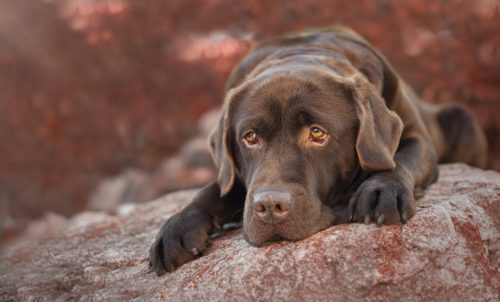
Like humans, pets can be affected by an over or underactive thyroid gland. In dogs an underactive thyroid, or hypothyroidism, is most common.
Any breed of dog can develop hypothyroidism, although it is most commonly seen in medium to large breed pedigree dogs. Most cases are seen during middle age with an average age of diagnosis of 7 years old.
Hypothyroidism can be caused by immune mediated destruction or by a degeneration in the thyroid gland, at the moment there is no known cause although there may be a genetic link in some breeds. Very rarely, some dogs can be born with congenital hypothyroidism and this will lead to an abnormally slow growth rate or dwarfism.
Signs of hypothyroidism are usually gradual and can include:
- lethargy
- weight gain without an increase in appetite
- reduced tolerance to exercise and the cold
Changes can also occur in the skin with a poor quality and brittle hair coat, areas of alopecia (baldness) usually affecting the flanks and legs often with dark, pigmented skin and a hairless “rat tail”. Some cases will also develop a condition called myxoedema, where thickened skin causes droopy eyelids and a worried or tragic facial expression. Scurfy and scaly skin can also be seen and it is not uncommon for this to become infected.
Diagnosis of hypothyroidism can sometimes be complicated as there are a number of other conditions that can affect thyroid hormone production as well as mimic the common clinical signs.
For suspected cases we will start with a comprehensive history and clinical examination, if we are suspicious of hypothyroidism we will collect blood samples for analysis. As well as testing the thyroid hormones we will also want to check the rest of our patient’s organ function values and red and white blood cell parameters. In some cases the combination of clinical signs and blood results is enough to make a diagnosis and we can begin hormone replacement therapy, in others the results may not be as clear cut and further testing is needed.
Once a diagnosis has been made then we can start treatment with a replacement thyroid hormone. This treatment will be needed for the rest of your dog’s life and regular blood tests will be needed to monitor we are at the correct level.
If you are concerned your dog may be showing symptoms of hypothyroidism please call the surgery and we can arrange a consultation with one of our vets, or book an appointment online.
